|
|
|
Sort Order |
|
|
|
Items / Page
|
|
|
|
|
|
|
| Srl | Item |
| 1 |
ID:
097677
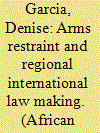

|
|
|
|
|
| Publication |
2009.
|
| Summary/Abstract |
This article analyses the political evolution and legal structure of the Economic
Community of Western African States (ECOWAS) Convention on Small Arms and
Light Weapons, Their Ammunition and Other Related Material, adopted in 2006,
within the broader context of the small arms debate at the regional (initiatives by Mali)
and international levels, principally at the United Nations. The ECOWAS Convention
breaks new ground as it is based on human security, international humanitarian law,
sustainable development and human rights principles. The ECOWAS Convention is
groundbreaking in many respects. It is innovative especially vis-à-vis basing its text on
international humanitarian law, international human rights law and development needs.
In comparison with all other instruments of law on small arms, it is one of the most
evolved.
|
|
|
|
|
|
|
|
|
|
|
|
|
|
|
|
| 2 |
ID:
087994
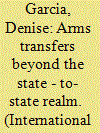

|
|
|
|
|
| Publication |
2009.
|
| Summary/Abstract |
Arms transfers beyond the state-to-state realm can have harmful effects for international security dramatically affecting the relations and behavior of states. This article examines why an emerging international norm on "prohibiting states to transfer arms to nonstate groups" has failed to diffuse at the international level. It discusses the already available international law framework existing at the regional and international levels upon which the potential norm could be built. The failure of the norm to diffuse at the international level can be primarily explained by the existence of a long-consolidated norm: the customary practice of states to transfer weapons to nonstate actors, that is, groups they deem legitimate to, without any interference or constraint.1 The unrestrained transfer of weapons is an established foreign-policy practice. It is the way states form, uphold alliances, extend friendships, and build spheres of influence (Sorokin 1994). Clearly, no state willingly wants to give this up. Therefore, the multilateral agreement on a norm barring most or all transfers of weapons to nonstate actors would curtail the freedom of action to build spheres of influence as states please. There are genuine ethical and moral dilemmas in this discussion, a nonstate actor may be a freedom fighter or a terrorist depending on different perspectives. The distinction between the categories "state" and "nonstate" actors may risk classifying actors in two camps: the good and the bad, respectively. This is problematic as a few states are known to be the most brutal perpetrators of egregious violations against their own citizens, whereas certain nonstate actors are legitimately fighting for the protection of vulnerable populations.
|
|
|
|
|
|
|
|
|
|
|
|
|
|
|
|
| 3 |
ID:
103044
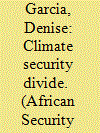

|
|
|
| 4 |
ID:
097659
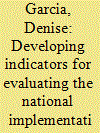

|
|
|
|
|
| Publication |
2009.
|
| Summary/Abstract |
This article develops a compilation of indicators to assess ease of access to small arms and implementation of regional arms control laws and protocols in Africa. It notes that the spread of small arms and the resultant armed violence undermines good governance in Africa more so than on any other continent.
|
|
|
|
|
|
|
|
|
|
|
|
|
|
|
|
| 5 |
ID:
155704
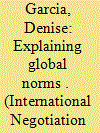

|
|
|
|
|
| Summary/Abstract |
International norms are central to world politics and they set boundaries for what is deemed commonly accepted behavior. The literature has not effectively explained the rise of new norms through negotiation and how actors from the Global South have played active roles, especially in the complex areas of developing security norms. This article argues that norm-making is not a unidirectional movement or phenomenon, but rather a highly circuitous process. The circuitous norm building model accounts for an increasing connectedness among domestic and regional/international levels in norm building in Global South and North countries.
|
|
|
|
|
|
|
|
|
|
|
|
|
|
|
|
| 6 |
ID:
181169
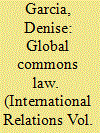

|
|
|
|
|
| Summary/Abstract |
The Global Commons – the high seas and the seabed, Antarctica, the atmosphere (including the ozone layer and the climate system), and outer space – have a distinctive status in international relations because these domains play a vital role in ensuring humankind’s survival, the subsistence of the planet, and the intergenerational custodianship of the human heritage. I call global commons law an ‘uncommon’ realm within international law that is composed of principles and practices that dovetail with treaties aimed at protecting humankind. These laws have an atypical purpose and are characterized by a commonality of interests based on the view that safeguarding these domains is in the interests of developing and developed countries alike, with scientists, activists, and international institutions jointly having a convening power to maintain peace. To elaborate on the impact and implications of the global commons law, I explain three of its functions: guardianship of future generations; creation of a comity for peace and peaceful settlement of disputes; and setting norms as the foundation for peaceful relations. These norms in turn have four key objectives: they provide common ground for peace and cooperation; ensure equity between rich and poor countries; create a forum for equitable burden-sharing; and prevent future harm. The Global Commons face threats – melting ice caps, greenhouse gases, and overfishing – that imperil the survival of humanity. This is then the moment to update and strengthen the mechanisms of global commons law.
|
|
|
|
|
|
|
|
|
|
|
|
|
|
|
|
| 7 |
ID:
138337
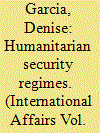

|
|
|
|
|
| Summary/Abstract |
This article introduces a novel concept, humanitarian security regimes, and enquires under what conditions they arise and what is distinctive about them. Humanitarian security regimes are driven by altruistic imperatives aiming to prohibit and restrict behaviour, impede lethal technology or ban categories of weapons through disarmament treaties; they embrace humanitarian perspectives that seek to prevent civilian casualties, precluding harmful behavior, protecting and ensuring the rights of victims and survivors of armed violence. The article explores how these regimes appear in the security area, usually in opposition to the aspirations of the most powerful states. The existing regimes literature has mostly taken a functional approach to analyzing cooperation, lacks a humanitarian hypothesis and does not explore the emergence of new regimes in the core area of security. The author argues that in the processes of humanitarian security regime-making, it is the national interest that is restructured to incorporate new normative understandings that then become part of the new national security aspirations. This article intends to fill this gap and its importance rests on three reasons. First, security areas that were previously considered to be the exclusive domain of states have now been the focus of change by actors beyond the state. Second, states have embraced changes to domains close to their national security (e.g. arms) mostly cognizant of humanitarian concerns. Third, states are compelled to re-evaluate their national interests motivated by a clear humanitarian impetus. Three conditions for the emergence of humanitarian security regimes are explained: marginalization and delegitimization; multilevel agency, and reputational concerns.
|
|
|
|
|
|
|
|
|
|
|
|
|
|
|
|
| 8 |
ID:
155702
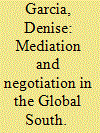

|
|
|
|
|
| Summary/Abstract |
The practice of international mediation is widely recognized as essential for international peace and security, and its advantages have been extensively acknowledged. It is also an integral component of international negotiation and the peaceful settlement of disputes. Nevertheless, most of the governmental and non-governmental actors involved in international mediation processes come from predominantly Northern countries. Very few states and civil society institutions from the Global South are engaged in international mediation initiatives or have invested in improving their national mediation capacities. Looking into the future, the involvement of the South in these efforts is needed more than ever. World leaders, from the North and the Global South need to revitalize principled commitments and allow great negotiators to come to the fore to reverse deadlocked and perilous situations in the search for peace and prosperity.
|
|
|
|
|
|
|
|
|
|
|
|
|
|
|
|
| 9 |
ID:
131383
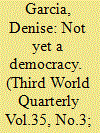

|
|
|
|
|
| Publication |
2014.
|
| Summary/Abstract |
Brazil is considered one of the more successful examples of democratic transition and consolidation in the developing world; and one of the fastest developing and emerging countries. This article contends that Brazil is not yet a fully established democracy, because it lacks the proper civilian checks and balances ensuring full authority over the armed forces, police and secret services. There are five main reasons for this: first, the Constitution does not provide a generalised guide for the institution of civilian oversight. Second, a change of cultural perceptions vis-à-vis the security sector entities is needed. Third, piecemeal rather than holistic or comprehensive legal and institutional transformation has occurred, with little civilian oversight of the armed forces. Fourth, the large structures still held by each of the armed forces require re-articulation and fundamental transformation. Finally, there is no fully fledged civil society participation in security sector life through the media and academia. These problems weaken democracy in Brazil. The course of democratisation in Brazil and the role the security sector played in the transition are examined before discussion of some of the more recent legal and political developments in the security sector, as part of the democratic consolidation. The conclusion presents insights from Brazil's experience and lessons for states facing similar transition challenges.
|
|
|
|
|
|
|
|
|
|
|
|
|
|
|
|
| 10 |
ID:
074378
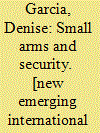

|
|
|
|
|
| Publication |
London, Routledge, 2006.
|
| Description |
xxv, 266p.
|
| Standard Number |
0415770513
|
|
|
|
|
|
|
|
|
|
|
|
Copies: C:1/I:0,R:0,Q:0
Circulation
| Accession# | Call# | Current Location | Status | Policy | Location |
| 051786 | 363.33/GAR 051786 | Main | On Shelf | General | |
|
|
|
|
| 11 |
ID:
099796
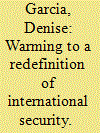

|
|
|
|
|
| Publication |
2010.
|
| Summary/Abstract |
The fundamental idea of this article is that the enormity and nature of the challenges created by climate change are redefining the understanding and definition of international security. The threats posed by climate change have become considered security threats, especially since 2007. I also argue that an international norm concerning climate change started emerging and became consolidated around the same time. The norm building process occurred due to three elements: a basic international legal regime, constituted since the 1992 United Nations Framework Convention on Climate Change (UNFCCC), its 1997 Kyoto Protocol (followed by ratification by the majority of states), and the 2009 political framework set out by the Copenhagen Accord. All this was guided by authoritative scientific evidence throughout. The consolidation of an international norm concerning climate change demonstrates that norm internalization processes in treaties do not automatically result in successful norm crystallization. It took a dramatic shift of position in the domestic arena in the United States and other recalcitrant states for the international norm to consolidate. This shift of mood was multilayered: i.e. it included the participation of many actors in society, especially local and state governments, as well as the private sector. Most importantly, the security aspects of climate change became known and this dimension of the debate gained enormous prominence.
|
|
|
|
|
|
|
|
|
|
|
|
|
|
|
|
|
|
|
|
|